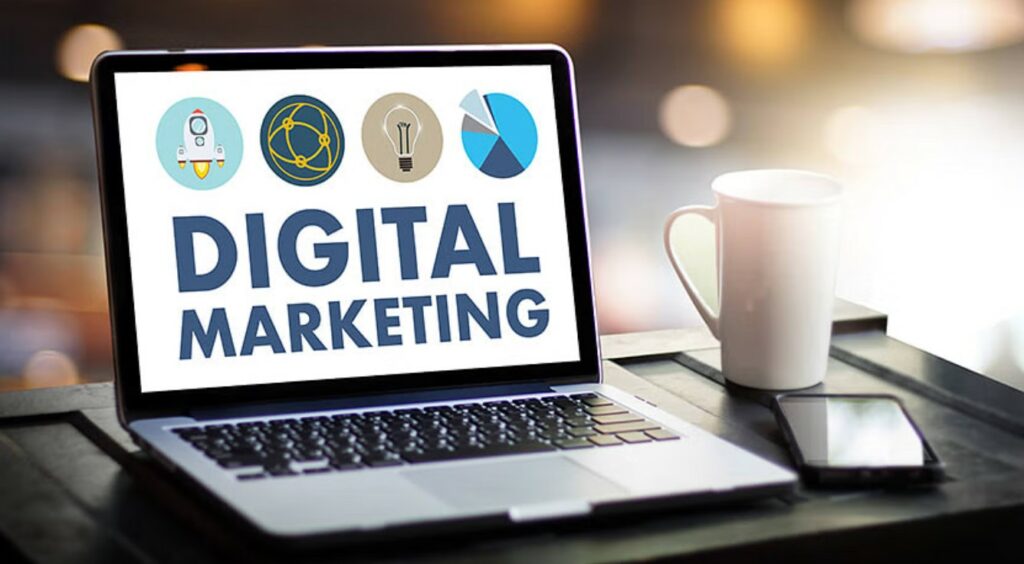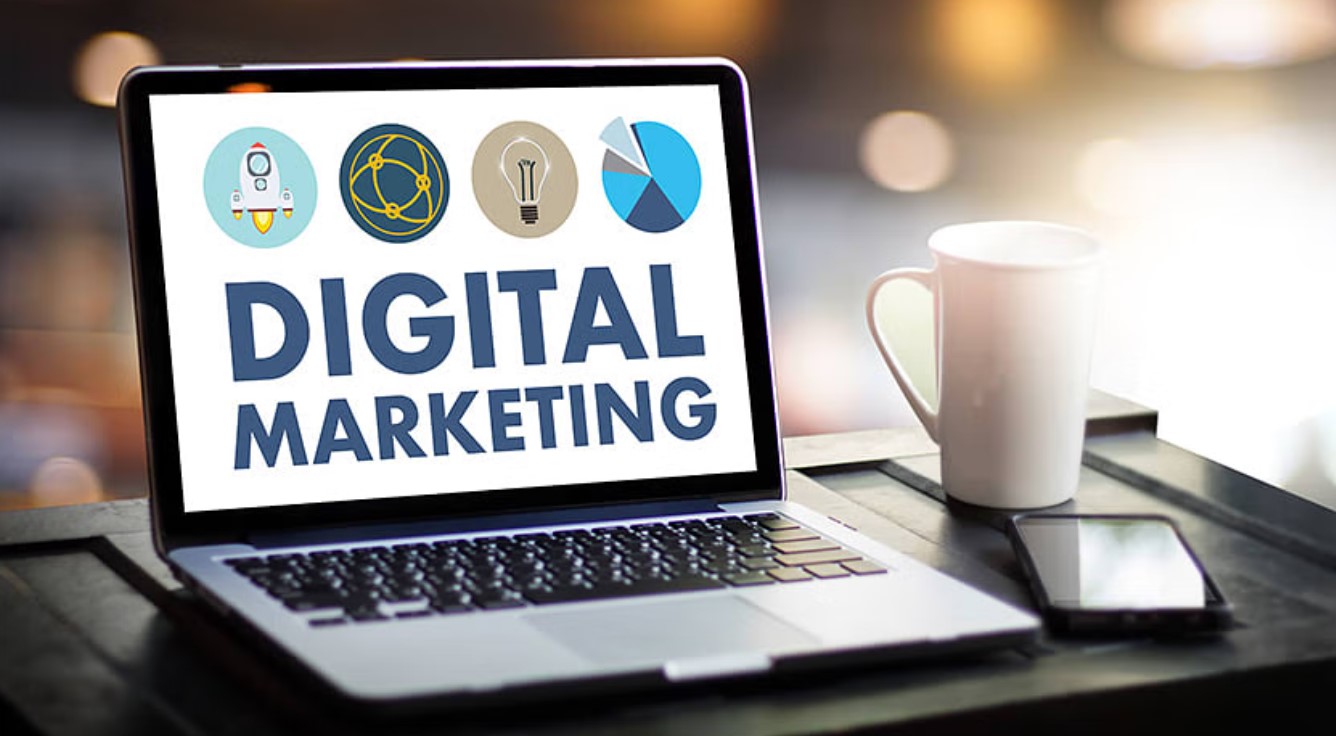Digital marketing stands as the vanguard of modern business strategy, a dynamic and multifaceted domain that has revolutionized the way brands interact with their audiences. In this digital era, where the internet’s tendrils reach into every aspect of daily life, digital marketing’s importance cannot be overstated. It’s not just another line item in the business strategy; it’s the heartbeat of brand engagement and customer interaction.
This expansive field employs a plethora of strategies and tactics, each designed to captivate and engage customers in the digital space where they spend an increasing portion of their lives. Whether scrolling through social media, searching on engines, or clicking through emails, customers are constantly interacting with digital content, making digital marketing an indispensable tool for businesses to capture attention, engage minds, and drive loyalty.
For small startups, digital marketing levels the playing field, offering tools and techniques once reserved for larger corporations. It allows these burgeoning businesses to punch above their weight, reaching audiences far and wide with a precision that traditional marketing could never achieve. For global corporations, digital marketing strategies are equally critical. They provide the means to maintain a pervasive and persistent presence in the lives of consumers, reinforcing brand messages, driving engagement, and fostering a sense of community and belonging among customers worldwide.
The power of digital marketing lies in its precision targeting. Gone are the days of broad-spectrum advertising hoping to catch the eye of a potential customer. Today’s digital marketing strategies are data-driven, targeted, and personalized, reaching individuals with tailored messages that resonate with their specific needs, desires, and behaviors. This precision not only increases the effectiveness of marketing efforts but also enhances the customer experience, delivering content that is relevant, useful, and welcome.
Digital marketing’s measurable nature marks a significant shift from the ambiguity of traditional marketing. Every click, view, like, and share is tracked and analyzed, offering a clear picture of what resonates with audiences and what doesn’t. This wealth of data allows businesses to refine their strategies in real-time, making adjustments to optimize performance and ROI. The ability to measure and adapt quickly is invaluable in the fast-paced digital world, where trends and consumer preferences can change in the blink of an eye.
The reach of digital marketing is unparalleled, breaking down geographical barriers and opening up global markets. Businesses can now speak directly to consumers on the other side of the world as easily as they can to those down the street. This global reach expands the potential customer base exponentially, offering growth opportunities that were unimaginable in the pre-digital era.
Understanding Digital Marketing
Understanding digital marketing is to recognize it as a multifaceted approach to reaching consumers through a variety of digital channels and platforms. It’s about leveraging the vastness of the internet and the intimacy of direct digital communication to deliver messages that resonate with individuals on a personal level. Digital marketing isn’t confined to any single platform or strategy; it’s an all-encompassing term that includes a wide array of marketing tactics and technologies used to reach consumers online.
At its core, digital marketing centers around the internet, which has become the most common medium for marketing campaigns. However, it’s crucial to understand that its scope extends far beyond web-based strategies to include channels like mobile phones, utilizing SMS and MMS, apps, electronic billboards, digital television, and radio channels, and more. These diverse channels offer a plethora of ways to reach consumers, each with its unique strengths and audience.
The essence of digital marketing lies in its ability to offer tailored experiences. It’s not just about broadcasting a message to a wide audience like traditional marketing but about having meaningful conversations and making connections. This personalized approach is possible due to the vast amounts of data and advanced targeting technologies available today, allowing marketers to understand and cater to specific consumer needs and preferences.
Digital marketing is an ever-evolving field. As technology advances and consumer habits change, so too do the strategies and tools of digital marketing. It’s a discipline that requires constant learning and adaptation, with marketers always on the lookout for the next trend or technological breakthrough that can give them an edge in the crowded digital landscape.
However, digital marketing isn’t just about leveraging technology and following trends. At its heart, it’s about understanding and connecting with people. It’s a blend of art and science, requiring creativity and technical knowledge in equal measure. Effective digital marketing doesn’t just drive traffic or increase engagement; it builds communities, inspires brand loyalty, and makes a lasting impact on the audience’s perception of a brand.
Understanding digital marketing means recognizing its role as a dynamic and integral component of modern business. It’s about seeing the bigger picture, understanding the digital consumer journey, and crafting strategies that deliver not just messages but value, experiences, and connections. As digital platforms continue to proliferate and integrate into every aspect of daily life, the importance and complexity of digital marketing will only increase, making it an exciting and essential field for businesses and marketers worldwide.
The Evolution of Digital Marketing
The evolution of digital marketing is a fascinating journey through technological advancements and changing consumer behaviors. It’s a narrative that reflects the broader story of the digital revolution itself. In the early 1990s, as the internet became more accessible, businesses began to see the web as a new frontier for advertising. Websites became digital storefronts, and email marketing emerged as a new, direct way to reach consumers. This period marked the initial shift from traditional, one-way advertising to a more interactive, engaging form of marketing.
As we moved into the 2000s, the term ‘digital marketing’ started gaining traction. This era was characterized by the rise of search engines and the birth of the social media phenomenon. Companies began to understand the importance of SEO (Search Engine Optimization) as a critical tool to get noticed in the increasingly crowded digital space. Social media platforms opened up a new way for brands to interact with consumers, offering a space for dialogue and community building that traditional media could never provide.
The mid-2000s to early 2010s saw the advent of smartphones and tablets, devices that made digital media an integral part of people’s lives. The ubiquity of these devices meant that consumers were online more than ever, and digital marketing strategies had to adapt to this new reality. Marketing became about providing a seamless experience across devices, with a focus on mobile optimization, app development, and responsive design.
This period also saw the rise of content marketing as a key strategy. Brands began to realize that they could attract and engage consumers with valuable, relevant content rather than just advertisements. This led to the development of sophisticated content strategies aimed at building long-term relationships with consumers, establishing trust and authority, and enhancing brand loyalty.
In recent years, the evolution of digital marketing has been marked by the rise of data analytics and machine learning. Marketers now have access to vast amounts of data that can be used to gain deep insights into consumer behavior, preferences, and trends. This data-driven approach has made marketing more personalized and targeted than ever before. Machine learning algorithms can predict consumer behavior, automate bidding for ads, personalize content, and much more, making marketing efforts more effective and efficient.
The current landscape of digital marketing is one of constant change and innovation. Technologies like augmented reality, virtual reality, and the Internet of Things (IoT) are opening up new possibilities for immersive brand experiences. The importance of social responsibility and ethical marketing is becoming more pronounced, with consumers expecting brands to not only provide value but also contribute positively to society.
The evolution of digital marketing is an ongoing story of adaptation and innovation. As technology continues to advance and consumer expectations evolve, so too will the strategies and tactics of digital marketers. What remains constant is the need for brands to connect with consumers in meaningful ways, providing not just products or services but experiences, stories, and values that resonate on a deeper level. The future of digital marketing will likely be characterized by even more personalization, more integration of technology into everyday life, and a continued focus on delivering value and relevance to consumers.
The Pillars of Digital Marketing
Search Engine Optimization (SEO)
Search Engine Optimization, or SEO, is a foundational pillar of digital marketing. It’s a meticulous process aimed at enhancing the visibility of websites in search engine results pages (SERPs). The essence of SEO is understanding how search engines work and what people search for. It involves optimizing various elements of your website and content, so they are attractive not only to users but also to search engine algorithms.
SEO is divided into several components, each critical to the overall success of online visibility. On-page SEO focuses on the content that’s “on the page”, and how to optimize it to boost the website’s ranking for specific keywords. Off-page SEO involves all the strategies outside your website that can influence your rankings within search engine results, primarily through building backlinks. Technical SEO, another crucial aspect, includes optimizing the website’s technical elements, like its code, to improve its ranking in search engines.
The goal of SEO is to ensure that when potential customers search for products, services, or information related to your business, they find you and not a competitor. It’s about being the answer to what users are searching for and providing the best possible content to be the top choice. The strategies and techniques for SEO are continually evolving, driven by changes in consumer behavior and advances in search engine algorithms. Staying ahead in SEO requires a commitment to learning and adapting strategies as needed.
Content Marketing
Content Marketing is another fundamental pillar of digital marketing, focusing on creating and distributing valuable, relevant, and consistent content to attract and retain a clearly-defined audience. It’s about understanding what your audience finds valuable and giving it to them to build a positive brand association and drive profitable customer action.
The scope of content marketing is broad and includes various formats like blog posts, videos, podcasts, infographics, and more. Each of these formats serves different purposes and can be used at different stages of the customer journey. For example, blog posts are great for driving traffic and educating readers, while videos can be more effective at keeping the audience engaged and explaining complex topics.
Effective content marketing is not overtly promotional but instead focuses on building a relationship with the audience by providing them with value. It’s a long-term strategy that focuses on building a strong relationship with your target audience by giving them high-quality content that is very relevant to them on a consistent basis.
Content marketing works in symbiosis with other digital marketing methods, particularly SEO, as quality content is part of what makes a website authoritative and relevant in the eyes of search engines and users. It’s about establishing your brand as a thought leader in your industry, creating pathways for organic search traffic, engaging users, and driving them towards conversion points.
Social Media Marketing
Social Media Marketing is an essential pillar of digital marketing that utilizes social networking platforms as a medium for brand promotion, audience growth, and direct customer engagement. In the digital age, social media platforms are not just channels for socializing; they are powerful tools that businesses use to directly reach and converse with their consumers. This practice involves creating and sharing content on social media networks in order to achieve marketing and branding goals.
The strategy includes posting text and image updates, videos, and other content that drives audience engagement, as well as paid social media advertising. With billions of people using social media every day, platforms like Facebook, Instagram, Twitter, LinkedIn, and Pinterest have become essential for businesses looking to increase their brand exposure and broaden their customer reach.
The key to successful social media marketing goes beyond just posting updates to your company’s social media profiles. It also includes engaging with your audience and looking for new opportunities to increase reach and visibility. For instance, it involves monitoring your brand reputation and responding to direct feedback from customers, or analyzing the data on engagement and refining your strategy accordingly.
Choosing the right platforms where your target audience spends the most time, tailoring your content to fit the platform’s unique style, and consistently measuring your results and engagement are all critical components of effective social media marketing. It’s a dynamic field that requires creativity, adaptability, and an understanding of the ever-changing trends and algorithms of each platform.
Pay-Per-Click (PPC)
Pay-Per-Click (PPC) advertising is a model of internet marketing in which advertisers pay a fee each time one of their ads is clicked. Essentially, it’s a way of buying visits to your site, rather than attempting to “earn” those visits organically. PPC is known for its ability to allow advertisers to execute highly targeted ads, thereby offering a high return on investment if managed correctly.
One of the most popular forms of PPC is search engine advertising, allowing advertisers to bid for ad placement in a search engine’s sponsored links when someone searches on a keyword that is related to their business offering. For instance, if we bid on the keyword “PPC software,” our ad might show up in the very top spot on the Google results page.
Every time our ad is clicked, sending a visitor to our website, we have to pay the search engine a small fee. When PPC is working correctly, the fee is trivial, because the visit is worth more than what you pay for it. A lot goes into building a winning PPC campaign: from researching and selecting the right keywords, to organizing those keywords into well-organized campaigns and ad groups, to setting up PPC landing pages that are optimized for conversions.
PPC marketing is beneficial for everyone:
- For advertisers: They can put their message in front of people who are most likely to be interested in their products.
- For users: Research indicates users click on paid search ads more often than any other form of digital advertising, meaning people really don’t mind being advertised to, provided that the products and services advertised actually fit the searcher’s needs.
- For search engines: PPC enables search engines to cater to searchers and advertisers simultaneously. The searchers comprise their user-base, while the advertisers provide them with their revenue stream.
Affiliate Marketing
Affiliate Marketing is a performance-based marketing strategy in which a business rewards one or more affiliates for each visitor or customer brought by the affiliate’s own marketing efforts. It’s essentially a modern interpretation of a very old idea — getting a commission on a sale. This method spreads the responsibilities of product marketing and creation across parties, leveraging the abilities of a variety of individuals for a more effective marketing strategy while providing contributors with a share of the profit.
To participate in an affiliate marketing program, you’ll need to take these five simple steps:
- Find and join an affiliate program: Look for affiliate programs that fit your industry, niche, or personal interests. Popular platforms include Amazon Associates, Commission Junction, and ShareASale. Choose programs with products or services that you believe in and are relevant to your content or audience.
- Pick which offers to promote: Once you’ve joined an affiliate program, select the products or services you want to promote. Consider what would be most beneficial or interesting to your audience. It’s usually best to promote products that you are familiar with and can genuinely recommend.
- Obtain a unique affiliate link for each offer: After choosing the offers, you’ll receive a unique affiliate link for each one. This link tracks the traffic and sales you generate. Make sure to use this link in your content, so the program can track the leads or sales back to your efforts.
- Share those links on your blog, social media platforms, or website: Integrate your affiliate links naturally into your content. This could be through blog posts, social media posts, emails, or other types of content. Ensure that the integration feels natural and provides value to your audience.
- Monitor your performance and optimize your strategy: Keep track of how your affiliate links perform by checking the analytics provided by the affiliate program. Look at metrics like click-through rates, conversion rates, and total earnings. Use this data to understand what’s working and what’s not, and adjust your strategy accordingly. Experiment with different types of content, promotion strategies, and products to find what yields the best results.
By following these steps, you can effectively participate in an affiliate marketing program and start earning a commission for promoting products or services that align with your content and audience interests. Remember, success in affiliate marketing comes from building trust with your audience and recommending products that genuinely provide value.
Affiliate marketing is an ideal solution for those looking to gain control of their own income by focusing on performance-based revenue options. Working in tandem with a seller, a motivated affiliate marketer will be able to achieve a passive income from the comfort of their home without worrying about producing their product or service. While the success of the job does depend on the affiliate’s marketing skills, it can prove to be an effective way to meet your income goals as either a primary career or a profitable second job.
Native Advertising
Native advertising is a sophisticated and subtle approach to marketing that involves creating ads that are so cohesive with the page content, assimilated into the design, and consistent with the platform behavior that the viewer feels the ad belongs there. Promoted search results and sponsored social media posts are common examples of native advertising. This method is effective because it doesn’t disrupt the user’s browsing experience. Instead, it provides value by offering content within the context the user is already engaged with.
The key to successful native advertising is that it’s non-disruptive – it exposes the reader to advertising content without sticking out like a sore thumb. It requires a high level of creativity and understanding of the target audience’s interests and behaviors. The content needs to be engaging and relevant, providing value to the audience while subtly guiding them towards a brand or product. The effectiveness of native advertising is typically measured through engagement rather than direct sales, making it a preferred choice for brand awareness and engagement strategies.
Marketing Automation
Marketing automation is a technology that manages marketing processes and multifunctional campaigns, across multiple channels, automatically. It streamlines lead generation, segmentation, lead nurturing, lead scoring, measurement processes and more. An effective marketing automation tool helps identify your audience, design the right content, and automatically trigger actions based on schedules and customer behavior. The goal of marketing automation is to deliver the right content, at the right time, to the right audience, thereby increasing the efficiency of marketing campaigns.
The use of marketing automation makes processes that would otherwise have been performed manually much more efficient and makes new processes possible. It is often used in conjunction with strategies like inbound marketing to personalize the customer journey and drive sales revenue. Businesses benefit from the enhanced customer engagement and retention associated with effective marketing automation. However, it requires a deep understanding of your audience and their needs, as well as continuous monitoring and optimization to ensure the desired results are achieved.
Email Marketing
Email marketing is one of the most cost-effective marketing strategy for small businesses. It is the act of sending a commercial message, typically to a group of people, using email. In its broadest sense, every email sent to a potential or current customer could be considered email marketing. It involves using email to send advertisements, request business, or solicit sales or donations. Email marketing strategies commonly seek to achieve one or more of three primary objectives, to build loyalty, trust, or brand awareness.
The content of an email marketing campaign is often a message about a product or a deal or an announcement related to the company. In broader terms, email marketing can also refer to building relationships with your customers or improving customer retention through various types of emails: promotional emails, regular newsletters, and personalized messages. The success of email marketing is measured by open rates, click-through rates, and conversions. It’s a direct way of communicating with your leads and nurturing them into customers, making it a crucial tool in every marketer’s arsenal.
Online PR
Online PR is the practice of securing earned online coverage with digital publications, blogs, and other content-based websites. It’s much like traditional PR, but in the online space. The channels you can use to maximize your PR efforts include:
- Digital Publications: Securing features or mentions on popular digital magazines or news sites.
- Blogs: Getting influential bloggers to mention or review your product or service.
- Online Reviews: Managing your reputation by encouraging positive reviews and handling negative ones wisely.
- Social Media: Engaging with your audience, responding to comments or complaints, and maintaining a solid brand presence.
Online PR is all about building relationships with online journalists, bloggers, and influencers to gain high-quality backlinks, social media mentions, and improve your Search Engine Optimization (SEO). It’s about creating a narrative that extends beyond your company website and directly into the spaces where your target audience spends their time online. The effectiveness of online PR can be measured through various metrics like website traffic, backlink quality, and brand sentiment. It’s a critical component of digital marketing that helps improve brand presence and reputation online.
The Role of Digital Marketing
In the digital age, the role of digital marketing is pivotal in shaping customer experiences and influencing their journey from awareness to advocacy. It’s about crafting a narrative that resonates with the audience, using a variety of channels and touchpoints to create a seamless and personalized experience. Digital marketing enables businesses to dissect vast demographics and understand the nuances of consumer behavior, preferences, and feedback. This insight is invaluable, allowing for more informed business decisions, more targeted marketing strategies, and ultimately, more effective customer engagement.
Digital marketing isn’t just about broadcasting a message; it’s about engaging in a conversation. It’s a two-way street where feedback is as crucial as the message itself. This interactive nature allows businesses to respond quickly to market changes, customer preferences, and emerging trends, ensuring that the marketing strategy is always aligned with the customer’s needs and expectations. Moreover, digital marketing provides a level of measurement and analytics that was previously unattainable, enabling businesses to understand the effectiveness of their efforts and continuously optimize their strategies for better results.
The comprehensive experience that digital marketing aims to provide encompasses all customer touchpoints, from the initial awareness stage through consideration and purchase, all the way to loyalty and advocacy. It’s about creating a consistent and cohesive journey, regardless of the channel or platform. Whether a customer interacts with a brand through social media, email, a website, or even a physical store, the experience should be unified and reflective of the brand’s values and messaging.
The Tools and Platforms in Digital Marketing
Digital marketing is a field that’s constantly evolving with the advancements in technology. Marketers need to stay ahead of the trends and adapt to the ever-changing digital landscape. Tools and platforms like Page Ads provide businesses with a comprehensive suite of solutions to enhance their digital marketing efforts. These platforms offer various tools for SEO, content marketing, social media marketing, PPC, and more, helping businesses to create, manage, and optimize their digital marketing campaigns effectively.
Challenges in Digital Marketing
The realm of digital marketing, while ripe with opportunities, is fraught with challenges that marketers must navigate to succeed. One of the most daunting challenges is the sheer noise and competition in the digital space. With millions of websites, social media posts, emails, and ads vying for attention, standing out in the crowded digital landscape is increasingly difficult. Brands must not only capture attention but also maintain engagement in an environment where users can simply scroll or click away from content that doesn’t resonate immediately.
Moreover, the rapid pace of technological change presents a significant challenge. Digital marketing tools, platforms, and best practices are constantly evolving. What worked yesterday may not work today and could be obsolete tomorrow. Marketers must continually educate themselves on the latest tools, technologies, and trends. They need to be agile, ready to adopt new strategies, and abandon outdated practices. This requires a commitment to continuous learning and a willingness to experiment and take risks.
Another challenge is the increasing concern over privacy and data security. Consumers are more aware of how their data is being used and are demanding greater control and privacy. This has led to stricter regulations around data usage and protection, such as the General Data Protection Regulation (GDPR) in Europe. Marketers must navigate these regulations carefully, ensuring that their digital marketing strategies are not only effective but also compliant with laws and respectful of consumer privacy.
The Future of Digital Marketing
Looking ahead, the future of digital marketing is a tapestry woven with integration and personalization, powered by evolving technology. As digital technologies continue to permeate every aspect of our lives, marketing strategies will become more integrated, providing a seamless and cohesive experience across all channels and touchpoints. This integration will extend beyond marketing, encompassing the entire customer experience, from the first point of contact to post-purchase engagement and beyond.
Personalization will be at the heart of future digital marketing strategies. Consumers expect experiences tailored to their needs, preferences, and behaviors. Advances in artificial intelligence and machine learning will enable marketers to analyze data more effectively, predict consumer behavior, and deliver highly personalized content and recommendations. This will allow for more targeted marketing that speaks directly to the individual, increasing engagement and conversion rates.
The future will also see an increase in the use of emerging technologies such as augmented reality (AR), virtual reality (VR), and the Internet of Things (IoT). These technologies will offer new and innovative ways to engage with consumers, creating immersive and interactive brand experiences. For example, AR can provide virtual try-ons for products, VR can offer virtual tours of destinations or properties, and IoT can provide personalized shopping experiences based on real-time data from connected devices.
As consumers become more concerned about sustainability and corporate responsibility, digital marketing will increasingly focus on building trust and demonstrating brand values. Brands will need to be transparent about their practices, actively engage in social issues, and demonstrate their commitment to making a positive impact on society and the environment.
Wrapping It Up
Digital marketing is an ever-evolving field that requires continuous learning and adaptation. It’s a crucial element for any business looking to thrive in this digital age. With the right strategies and tools, businesses can leverage digital marketing to create meaningful engagements, build lasting relationships with customers, and drive sustainable growth. Platforms like “Page Ads” offer a range of tools that help businesses of all sizes to maximize their digital marketing efforts and stay ahead in the competitive market. As we move forward, the importance of digital marketing is only set to increase, making it an essential skill for marketers and businesses alike.





